

Tao Te Ching
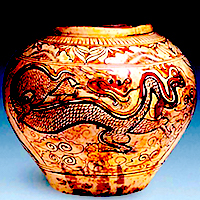
Shandong Institute of Cultural Relics
Yuan Dynasty 元朝 (1271 – 1368 CE)
Although maligned by much of history as a time and influence of bloodthirsty barbarianism, the Yuan dynasty helped establish the modern world by promoting religious tolerance, international law, and the cross-fertilizing of multi-cultural medicine, science, trade and art. Establishing itself at a time when Europe and many other countries were experiencing deep corruption, intolerance, and exploitation; the actual facts show that the real “barbarians” were the culturally chauvinistic, narrow-religion-trapped believers, and tradition-blinded people of both that and our own time. The first foreign dynasty to rule all of China, the Yuen territory included most of modern China plus many surrounding areas including Mongolia. Trade dramatically increased during this era bringing immense cross-cultural influences. Drama, the novel, and writing in common language all developed during this time. Diverse new crops became popular, Buddhism deeply influence the government, Tibetan Tantric Buddhism permeated the culture (though Taoism was persecuted), and Muslims brought cartography, astronomy, and medical advances. Made famous in the West by Marco Polo whose accurate descriptions of China’s sophistication, advancement, and science were so far beyond Europe that few believed his accounts.
Sages (37)
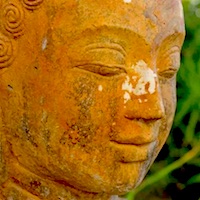
Bassui Tokushō 抜隊 得勝
1327 – 1387 CE
Meditation master without distraction
A student of Sōtō and Rinzai as well as Ch'an schools, Bassui criticized the state of practice and realization during his time. He thought most teachers and students either tilted either too far toward understanding only the words or too far toward only trying to understand the sense; either too much emphasis on dogma and form or too much on freedom and spontaneity. Personally, he refused to wear robes or engage in the traditional rituals and focused on meditation practice itself. He preferred solitude and lonely hermitages; but, because of his clear realization, large numbers of students continually followed and sought him out.
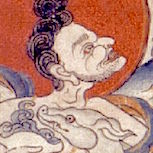
Bhikṣanapa བྷི་ཀྵ་ན་པ། ("Siddha Two-Teeth")
940 CE –
Mahasiddha #61
Bhikshanapa བྷི་ཀྵ་ན་པ། “Siddha Two-Teeth” (10th century CE)
Low caste and very poor, Bhikshanapa unexpectedly inherited some wealth. Like most people today winning a lottery or inheriting unaccustomed riches, he quickly lost it all along with his fair-weather friends. This led to a period of intense self-loathing and depression but also an openness to meeting and hearing a teacher and new way of experiencing the world. Seeing through his consumerism andspiritual materialism, he metaphorically (and possibly physically too), lost all but two of his teeth which became symbols for the balance and harmony of wisdom and skillful means. Resuming his external life style of roaming from village to village, he transformed from a miserable, needy beggar only thinking about himself into a wonderful teacher constantly dedicated to helping others. Mahasiddha #61
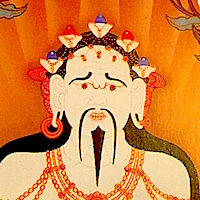
Campaka ཙ་མྤ་ཀ (“The Flower King”)
820 CE –
Mahasiddha #60
Extremely wealthy, powerful, caught up in pleasure, and sitting on a throne made from sweet-smelling flowers; Kampala met a wandering yogi. He tried to impress the sage with the splendors of his kingdom and the beauty of his flowers but the sage told him the truth, that his flowers smelled great but his body not so much, that his realm was wonderful but before long it and he would be gone. Realizing the superficiality and meaninglessness of his life, Kampala began a spiritual path but only shifted his physical materialism into spiritual materialism. Directed to focus his meditation on “the flower of pure reality,” he practiced and finally realized the empty essence of his mind. Mahasiddha #60
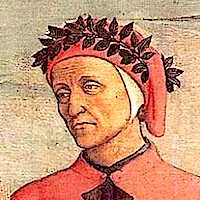
Dante (Durante degli Alighieri)
1265 – 1321 CE
Dante fell madly in love with Beatrice when she was only 8 years old and described his passion as “a God stronger than I who came and ruled me.” This unrequited love lasted through her marriage to another, her death at only 24, and throughout Dante’s life. It inspired his great work, The Divine Comedy now considered the greatest book in the Italian language and most important Middle Ages poem. Dante’s politics led to his exile, loss of citizenship and property, 15 years of poverty-stricken wandering, and a decree for him to be arrested and burned alive. His vivid descriptions of hell were based on personal experience and his writings saved him from the intensity of his suffering as it helped establish modern literature. Florence apologized for his exile 700 years later.
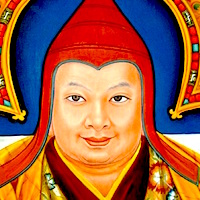
Dölpopa Shérap Gyeltsen དོལ་པོ་པ་ཤེས་རབ་རྒྱལ་མཚན།
1292 – 1361 CE
A teen-aged run-away on-the-road spiritual seeker; Dolpopa became one the most influential Tibetan teachers, one of the most original thinkers in all of Tibetan history, one of the greatest experts on the Shambhala Kalacakra teachings, and a figure so controversial he is still inspiring debate 700 years later. It’s said that when followers of the traditional lineages heard these teachings, they “experienced seizures and scrambled brains.” He described a True Self, a Buddha nature, a "Diamond Self,” an unconditioned, living truth and presence within all of us. He agreed with the traditional teaching that absolute and relative are both empty but taught that they are empty in different ways, the relative empty of self-nature; the absolute empty of other but not empty itself (the Zhentong view). His Jonang tradition was violently suppressed by the Tibetan government during the 17th century, banned by Gelug authorities, and attacked in an attempt to wipe it out by the Fifth Dalai Lama. It survived however as a powerful influence on all of Tibetan Buddhism and crucial to the 19th century Rimé (རིས་མེད) movement.
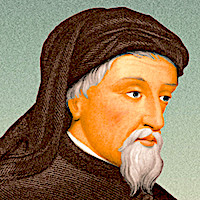
Geoffrey Chaucer
1343 – 1400 CE
“Father of English literature”
Scientist, philosopher, diplomat, “Father of English literature,” and greatest Middle Ages English poet; Chaucer transitioned literature in French and Latin to an English for the English-speaking. Also a page, bureaucrat, soldier, messenger, administrator, and valet; he portrayed and spoke for the common person. This support for the populace however created a backlash from the monarchy and he was fined and imprisoned. Claimed by the Protestant movement as an early forefather, he tried to separate religion from superstition, was rumored to have beaten up a Franciscan Friar on a public street, and supported religious reform.
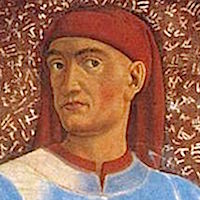
Giovanni Boccaccio dʒoˈvanni bokˈkattʃo
1313 – 1375 CE
Close student, friend and collaborator with the “Father of the Renaissance,” Petrarch; Boccaccio became a popular poet/writer, “the first Greek humanist in Western Europe,” and promoted the ancient literature, philosophy, and history which set the stage for the Renaissance. His book on classical mythology became a key reference for 400+ years and challenged Christian belief that only the Bible was relevant, that there was only harm in “pagan” writings. In an early nod to feminist proposition, he wrote the first collection devoted to the biographies of famous women. Living through a tumultuous time of political intrigue, the executions of his friends, bitter poverty and bad health; he resisted many of the era’s superstitious and setting-sun forces; translated works by Homer, Euripides, and Aristotle; and helped launch one of history’s most influential shifts, the Renaissance.
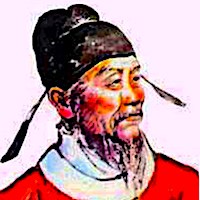
Guo Shoujing 郭守敬 (Ruosi, Kuo Shou-ching)
1231 – 1316 CE
One of the history's most influential scientists
Most highly regarded Chinese engineer, astronomer, mathematician of all time; a child prodigy and Kublai Khan’s chief science advisor, Guo Shoujing developed a calendar used for 363 years, the longest use of one calendar in all of Chinese history and the foundation for the Gregorian calendar that is still the world’s most used calendar. Spreading an approach called "evidential learning,” he became the leading influence on the development of Chinese science. He invented astronomy tools that calculate the accurate length of a year, an astrological compass using the stars instead of magnets, perfected watches and clocks that greatly increased accuracy, and perfected irrigation and reservoir techniques that increased harvests for hundreds of years.
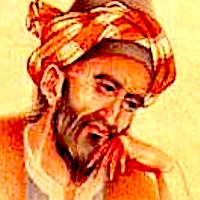
Hafiz خواجه شمسالدین محمد حافظ شیرازی (Hafez, Shams-ud-Dīn Muḥammad)
1315 – 1394 CE
Inspiring friend to the true and free human spirit
Mystic poet, “tongue of the invisible,” living oracle, “a poet for poets,” one of the world’s best spiritual friends and guides; Hafiz wrote poems that dissolve the walls separating people from each other, from nature, and from sacred awareness. For centuries readers in the Persian world have used him as a kind of I Ching or astrology to find practical, personal, and wise advice for the quandaries of daily life. Even Queen Victoria is rumored to have used his poems in this way. Although a Sufi in the Islamic traditions, Hafiz obviously goes far beyond and kind of sectarian fixation and exposes a true realization of universal truth, the perennial philosophy, and authentic, sacred-world living.
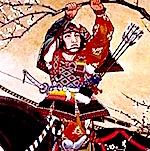
Hojo Tokimune 北条 時宗
1251 – 1284 CE
Hojo Tokimune, Hōjō 北条 時宗 (1251 – 1284)
Mainly responsible for the spread of Zen Buddhism in Japan and ruler during the time Kublai Khan was invading and trying to conquer; Hojo Tokimune as the 8th Shogun and with the help of typhoons repelled two Mongol invasions. (The second included 4,400 ships and over 140,000 troops.) He personally planned and led the defense and in the process established a new warrior class called samurai which became one of the most fierce fighting forces the world has ever known. He brought famous teachers from China, built temples, and funded the transplanting and translation of Chinese Chan Buddhism into Japanese Zen. Although dying when only 33 years old, his influence on Japanese politics and culture ran deep and still continues.
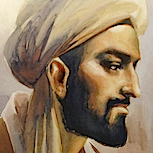
Ibn Khaldun أبو زيد عبد الرحمن بن محمد بن خلدون الحضرمي
1332 – 1406 CE
One of the world’s greatest political theorists, considered one of the greatest philosophers of the Middle Ages, a founding father of modern economic theory, sociology, and demography; Ibn Khaldun was a a North African Arab historian who defined government as "an institution which prevents injustice other than such as it commits itself" and taught that government is a necessary evil that should be constrained to a minimum. Toynbee described his writing as “the greatest work of its kind that has ever yet been created by any mind in any time or place” and his influence is still strong throughout the world.
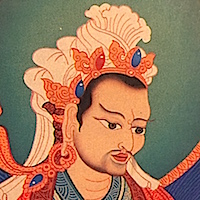
Indrabhūti ཨིནྡྲ་བྷཱུ་ཏི། ("The Enlightened Siddha-King")
892 CE –
Mahasiddha #42
Indrabhuti ཨིནྡྲ་བྷཱུ་ཏི། The Enlightened Siddha-King (late 9th century)
“The first tantrika,” archetypal tantric king, and inspiration for several tantric lineages; Indrabhuti for political reasons pledged his Buddhist sister Laksminkara in marriage to the prince of a neighboring Hindu kingdom. She went to live with the neighboring prince but soon became disillusioned with the materialism, superstition, and decadence of her new country. Late one night she fled the palace and found a cave in the mountains where she lived and practiced meditation, attained enlightenment and scandalously started teaching untouchables. This greatly upset the Hindu king but inspired Indrabhuti to do the same and leave the comfort of palace life to devote himself completely to his spiritual path. He rejected however a path that rejected sensual pleasure and sex and practiced the Guhyasamaja father-tantra in the Anuyoga Dzogchen lineage. Mahasiddha #42
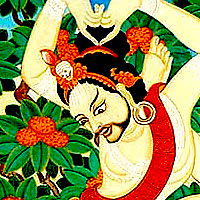
Jālandhara ཛཱ་ལནྡྷ་ར་པ། ("The Ḍākinī's Chosen One")
888 CE –
Mahasiddha #46
Jalandhara ཛཱ་ལནྡྷ་ར་པ། “The Ḍākinī's Chosen One” (late 9th century)
Another wealthy and privileged brahmin who saw through the materialistic values of his culture and renounced it to search for a more meaningful life, Jalandhara left everything to live in a cremation ground meditating. Going on to become an important mother-tantra siddha, one of the nine naths, and guru to 10 of the 84 Mahasiddhas; he founded one of the two main nath lineages (A Hindu tradition favored by Kabir that blended Shaivism, Buddhism and Yoga traditions using Hatha Yoga to transform the physical into awakened perception of “absolute reality”), taught practices that unify the male and female forces, dissolve the subject/object dichotomy, and open the non-dual doors of perception. Mahasiddha #46
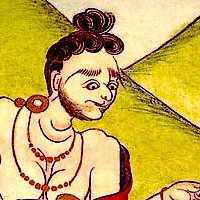
Jayānanda ཛ་ཡཱ་ནནྡ།། ("Crow Master")
11th - 12th century
Mahasiddha #58
A Tantric Buddhist master practicing in Bengal during a time when Buddhism was illegal, Jayananda was exposed by a jealous neighbor and imprisoned by the anti-Buddhist king. Before being captured though, he had befriended and fed a big flock of crows. In Tibetan culture crows are considered bad omens, capable of bringing great harm, and feared. But in a symbol of tantric transformation, Jayananda had made the crows allies. Then—metaphorically as crows or symbolically as an inclusion of the negative—the king was upended, reduced to hiding under his thrown, and as a consequence became a great and influential siddha himself. Mahasiddha #58
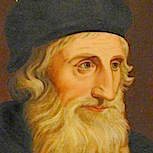
John Wycliffe
1320 – 1384 CE
Iconoclastic theologian, philosophical dissident, and champion of the common people; Wycliffe translated the Bible into English undermining Church authoritarianism and belief that people needed a spiritual mediator to tell them what was true, ethical and good. He criticized the political power, materialistic wealth and corruption common with the clergy and papal hierarchy of his time helping to even out the extreme rich-poor gap. He influenced Jan Hus, Martin Luther, and the beginnings of Protestantism; he was condemned as a heretic, his bones were dug up, his writings were burned and banned - and his influence continues.
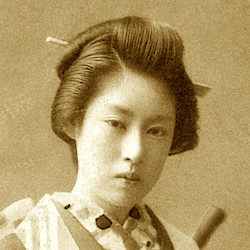
Kakusan Shido
1252 – 1305 CE
Kakusan Shido, Horiuchi (1252 - 1305)
During a time when men could easily divorce their wives but it was almost impossible for women and knowing personally how often women were used as pawns in male wars and revenge killings, Shido established Tokeiji 松岡山東慶寺 - a Rinzai Zen convent and the first used to shelter women.
Shido’s husband was the ruler known for repelling Kublai Khan’s Mongol invasion, spreading Zen Buddhism, and establishing the Samurai tradition. When he died, her dealing with the political intrigue led to this inspiration and the refuge called the “Divorce Temple.” It operated for over 600 years, sheltered runaway wives, gave them counseling and legal help. After helping two daughters of emperors, an emperor gave this extraterritorial rights. This empowered it to officially help divorcées and greatly increased its ability to help women in need.
During just the Tokugawa period, 2,000 women were sheltered and Zen luminaries like Reginald Horace Blyth, and D.T. Suzuki are buried there.
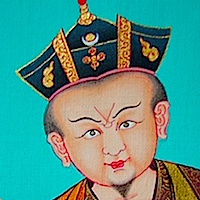
Karma Pakshi ཀརྨ་པཀྴི་
1204 – 1283 CE
Karma Pakshi ཀརྨ་པཀྴི་ (1204 – 1283)
The 2nd Gyalwa Karmapa and descended from a royal bloodline, Karma Pakshi brought the ancient, pre-Buddhist, shamanistic tulku (sprul sku) tradition into Tibetan Buddhism. Traveling widely in Tibet, Mongolia, and China he met Marco Polo but refused Kublai Khan’s request to stay in China. This incurred the emperor’s anger but he transformed it into a respect so deep that he was given the Mongolian name Pakshi (Bagshi) traditionally reserved for the highest Mongol shamans. Famous for his healing powers, sorcery, and ecstasy; he supported religious tolerance, non-Buddhist religions, and created immense balance and harmony. Bringing an ancient pillar of Dharma King Ralpacan (802-836 CE) known as "son of God" into the courtyard of his seat at Tsurphu, he further established his roots in the same ancient tradition that became the Orphic mysteries in pre-Socratic Greece and set up the conditions for the Dalai Lama’s blending of spiritual and secular leadership.
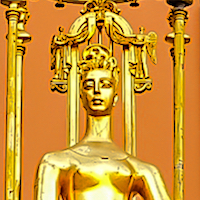
Khutulun (Turandot)
1260 – 1306 CE
Mongolian "Tiger Woman"
Daughter of Genghis Khan's cousin, Kaidu—the most powerful Central Asian ruler of the time—Khutulun became a famous warrior, wrestler, and political influence. Marco Polo described how she could ride into an enemy swarm and snatch a captive like a hawk grabbing a chicken. Beautiful, powerful, and charming; she challenged her many suitors with wrestling competitions and won thousands of horses before finally accepting one. She was chosen by her father to succeed him but the male relatives stopped the succession. She became known in the West as Turandot and memorialized by François Pétis de la Croix, Carlo Gozzi, Friedrich Schiller, Goethe, and—most famously—by Giacomo Puccini. Her renown continues today in many stories and movies, as a popular and extremely successful Australian race horse, and in the Netflix series, Marco Polo.
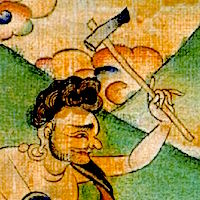
Koṭālipa ཀོ་ཊཱ་ལི་པ། ("The Peasant Guru")
1084 CE –
Mahasiddha #44
Kotalipa ཀོ་ཊཱ་ལི་པ། “The Peasant Guru” (2nd half of eleventh century)
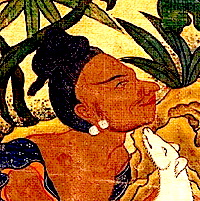
Kukkuripa ཀུ་ཀྐུ་རི་པ། ("The Dog Lover")
915 CE –
Mahasiddha #34
Kukkuripa “The Dog King” ཀུ་ཀྐུ་རི་པ། (10th century CE)
A wandering ascetic, Kukkuripa found and adopted a starving dog brought it back with him to the cave where he lived and meditated. Kukkuripa’s meditation practice took him to pleasurable, psychological god realms but memories of his dog connected him back to the real world where he saw his loyal dog sad, thin, and starving. Spurning the luxury, comfort and extravagance; he returned to the cold, dark, very uncomfortable cave out of compassion for the dog. The dog then became his teacher blending his mind-stream with the deepest insight of all the Buddhas. Naropa sent Marpa to study with him and he became one of Marpa’s most important teachers, famous for his songs of realization, and a “patron saint” for all the downtrodden and oppressed. Mahasiddha #34

Lin Mo Niang 林默娘
970 CE –
Lin Mo Niang (silent girl) 林默娘 akaMa Zhou, Mazu, Matsu, Tian Hou (c. 970)
"Empress of Heaven,”patron of seafarers, Confucian, Taoist and Buddhist adept, rainmaker, and Fujianese shamaness from an impoverished and uneducated fishing village where no one could read; Lin Mo Niang lived during a time of mass migrations from China’s north when refugees blended their culture with her local one. Most popular today in Taiwan but banned in Mainland China, her following called Mazuism has over 1500 temples in 26 countries, and statures as high as 139’ (42.3 meters). Equated with Guan
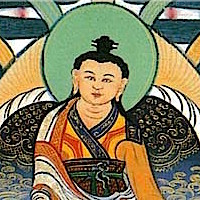
Longchenpa ཀློང་ཆེན་རབ་འབྱམས་པ། (Longchen Rabjampa, Drimé Özer)
1308 – 1364 CE
A child prodigy who could read and write at age 5, started learning the Nyingma tantras at 7, and was first ordained at 12; Longchenpa studied science as well as philosophy and Buddhism. One of ”the Three Omniscient Ones,”most important writer on the Dzogchen teachings, and abbot of the first Himalayan Buddhist monastery at Samye; he wrote more than 250 books and helped unify many diverse streams of Tibetan teachings into a comprehensive system known as Longchen Nyingthig. Considered an incarnation of a famous princess, Longchenpa was not only a monk but also fathered a son and daughter.
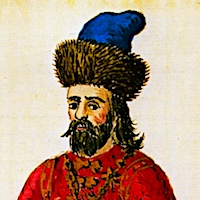
Marco Polo
1254 – 1324 CE
Epitome of adventurous business, political, and geographical exploration
Merchant par excellence, adventurous explorer, successful administrator for Kublai Khan in China, and popular author; Marco Polo became an inspiration for Christopher Columbus, the import-export global economy, and for most of the explorers who came after him. Setting off from Europe when only 17 years old, he spent 24 years in China becoming the governor of Hangzhou, returned to find his city of Venice at war with Genoa, tried to help but only ended up in jail where he described his travels to a cellmate who used them to write the famous book, Travels of Marco Polo. The difficulty and danger of travel in those days in illustrated by survival statistics: on their journey back from China, more than 600 people began with them but only 18 survived the 2-year journey to Hormuz. Later he expanded his business interests to become very wealthy, married and had three children. Frequently accused of exaggeration and fabrication, on his deathbed he responded to this criticism by saying, "I have not told half of what I saw."

Meister Eckhart (Eckhart von Hochheim)
1260 – 1328 CE
Philosopher, theologian, and mystic; Meister Eckhart represents a cultural and philosophical pivot at the end of the Middle Ages. In his own words but like Lao Tzu and the Buddha, he taught that Enlightenment is hidden inside our hearts and through emptiness, compassion and egolessness we become one. Though brought before the Inquisition and tried for heresy, his influence since includes from Schopenhauer (who said, “Buddha, Eckhardt, and I all teach essentially the same.”), to the Theosophical Society, to the politics of the UN’s Dag Hammarskjöld, to the psychology of Erich Fromm, to artists like Van Gough and Dürer, to authors like J. D. Salinger, and in modern times to theologians like Matthew Fox and Eckhart Tolle.
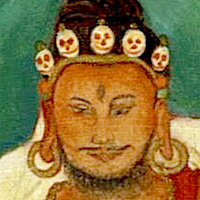
Mekopa མེ་ཀོ་པ། ("Guru Dread-Stare")
1050 CE –
Mahasiddha #43
Mekopa, མེ་ཀོ་པ། Guru Dread-Stare (11th century)
Always cheerful and kind Bengali food merchant taken as a student by a yogin customer, Mekopa saw into the vastness of his own mind, the uselessness of chasing desires, and harmfulness of action based on duality. His realization led him far beyond the limits of status quo, conventional social standards and behavior; into a lifestyle unbound by concern for people’s opinion, wandering about a cremation ground “like a wild animal” and into towns like a mad saint with dreadful, staring eyes. Mahasiddha #43

Ming Taizu 明太祖 (The Hongwu Emperor, Zhu Yuanzhan)
1328 – 1398 CE
One of the most influential emperors in all of Chinese history
Peasant farmer, destitute beggar at 16 when his family was killed in a flood, and Buddhist monk until his monastery was destroyed by the Mongols, Ming Taizu dramatically rose above his circumstances and led the rebellion against the Yuan and founded the Ming dynasty. As emperor he protected the poor, created irrigation systems, planted 50 million trees, and distributed land to peasants greatly increasing their standards of living. The population increased from 60 to 100 million. He studied the Tao Te Ching, based his government on Taoist principles drawing up a new legal code considered one of the greatest achievements of the age and also supported Islam. He prevented corruption and protected the weak but per historians was corrupted himself in later life.
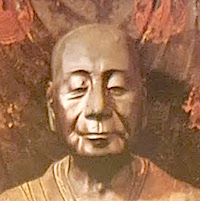
Mujū Dōkyō 無住道曉 (Ichien Dōkyō )
1227 – 1312 CE
”The Non-Dweller”
Champion of diversity and pluralism, Mujū Dōkyō appreciated and practiced many traditions only disapproving of intolerance, secularism, and all kinds of chauvinism. Mainly considered in the Rinzai tradition, he also studied Tendai, Pure Land, Hosso, Shingon, and Ritusu and criticized all forms of fundamentalism and teachers who denounced practices other than the ones they taught themselves. He wrote the Shasekishū (Sand and Pebbles), Zen anecdotes and stories immortalized by Paul Reps in Zen Flesh, Zen Bones.
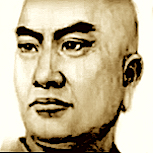
Nichiren Daishonin
1222 – 1282 CE
Born during a time of great internal strife, famines, disease, drought, typhoons, and earthquakes; Nichiren criticized other schools for distorting Buddhist teaching for personal gain, manipulating people for political and religious control, materialism and corruption. Persecuted by Buddhist priests, exiled, ambushed and almost killed, arrested with the intent to behead by soldiers, and later banished to a remote, primitive island; he described chanting as the only personal and social path to salvation and taught that women can attain enlightenment. A strong voice for common people and the down-trodden, he emphasized basic goodness, practices anyone can do, and started a powerful movement still strong today.
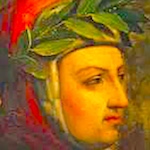
Petrarch
1304 – 1374 CE
The “Father of Humanism,” troubadour of romantic love, lover of nature, “Virgil born again,” the most famous unrequited lover, and most important poet of his age; Petrarch inspired an interest in ancient history and as “the first tourist” discovered and translated many old manuscripts including Cicero’s letters that sparked the 14th-century Renaissance. Holding the sense over the words, he challenged orthodoxy and invented new Latin terms to describe Greek philosophy, developed the concept of an historical “Dark Age” after the fall of Rome, a need for a cultural revival, inspired the political, military, and religious leaders of his time to ground their lives in classical values and contemplation. and his sonnets became a model for lyrical poetry through modern times.

Rumi مولانا جلالالدین محمد بلخی (Rumi Mawlānā Jalāl ad-Dīn Muḥammad Balkhī)
1207 – 1283 CE
Sufi mystic, Afghan hero, Sunni scholar-theologian, and one of the most widely read poets in the United States; Rumi went beyond religious, cultural, and ethnic borders to become a bridge between Shia and Sunni Muslims, East and West, between many of the world’s religions and cultures. Always a strong voice for peace, harmony, and understanding; he composed what’s considered the greatest poem written in the Persian language. While fleeing from a Mongol invasion with his family and during later journeys, he encountered many poetic and spiritual influences that transformed his conventional life of a scholar and jurist into an ascetic teacher who used music, poetry and dance to communicate the highest wisdom.
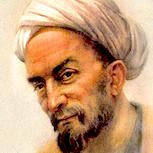
Saadi Shiraz سعدی شیرازی
1210 – 1292 CE
One of the greatest Persian poets and literary influences in medieval times and an influence on the West through people like Goethe, Hegel, Pushkin, and Barack Obama; Saadi - with a Zen-like approach similar to the great Tibetan teacher, Marpa - blended a mystical Sufi realization with a practical traveling merchant lifestyle. Escaping the hardship and poverty of his Baghdad youth, he traveled widely for 30 years including 7 years of imprisonment enslaved to hard labor. He then wandered 20 more years during the Mongol invasions mingling with ordinary people, bandits, refugees, spiritual teachers and farmers translating their experiences into poetry and wisdom teachings.
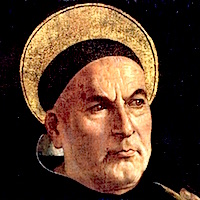
Thomas Aquinas
1225 – 1274 CE
Greatest Catholic theologian/philosopher, considered one of the top 12 western philosophers of all time, jurist, and Dominican friar; Aquinas had a dominant influence on Western culture, ethics, law, and political theory. Breaking from the theology of his time, he attempted reconciling ancient Greek philosophy (mainly Aristotle) with Christianity, extolled reason over blind faith, and created an intellectual platform for science that is still being used today by cognitive neuroscientists researching brain dynamics. Undermining dogmatic, rigid approaches to morality, his “Principle of double effect” emphasizes intention over consequences and is still debated in places like the U.S. Supreme Court. John Stuart Mill criticized this attitude stating that while intention may help judge character, it doesn’t effect the rightness/wrongness of an action.
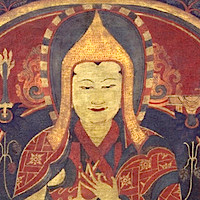
Tsongkhapa ཙོང་ཁ་པ། (Zongkapa Lobsang Zhaba, "the Man from Onion Valley")
1357 – 1419 CE
Born into a nomadic family with a Mongolian father and a Tibetan mother, Tsongkhapa became a famous teacher and founder of the Tibetan Buddhist Gelug school. His study and teachings stretched across many different lineages and he emphasized a blending of teachings, a unifying of different approaches, a balance of intellect and meditation. He used logic to undermine belief and open doors to insight much deeper than the words. His deep understanding of Buddhist teachings led to a fresh, innovative, and contemporary explication that became a dynamic influence on Tibetan Buddhism, culture, monasticism, and politics.
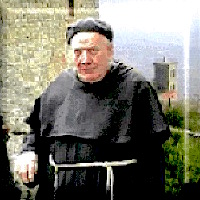
William of Ockham
1287 – 1347 CE
Major intellectual figure during medieval times, Franciscan friar at the center of the biggest political controversies of his era, and famous for his principle now called Occam’s razor; William of Ockham’s commentaries were condemned by a council of bishops and he was commanded to defend himself at a papal court. Instead, he fled the country, took refuge with the Holy Roman Emperor, and was excommunicated. One of the first to encourage a strong separation between church and state, a liberal democratic ideology, and social contract theory; his Occam's Razor theory became a small-is-beautiful, less-is-more foundation for modern science and natural philosophy.
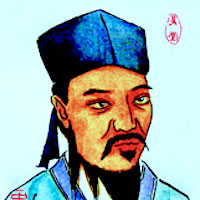
Wu Cheng 吴澄
1249 – 1333 CE
"Mr. Grass Hut"
Important scholar, poet, and professor; Wu Cheng supported and continued the Neo-Confucian movement begun by Zhu Xi. He went further than Zhu Xi’s emphasis on synthesizing the different traditions, included more Taoism, and worked to extend the standard curriculum beyond just the Four Books. He opposed superstitious beliefs and criticized the way scholars understood and practiced divination techniques. He wrote popular commentaries on the Tao Te Ching and most of the classic Chinese texts but his biggest influence was as a teacher and through his students who developed the School of the Mind and Heart during the Ming (1368-1644) and Qing (1644-1912) dynasties.
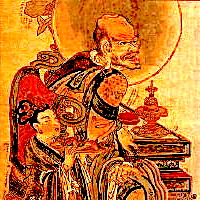
Yoshida Kenkō 兼好
1284 – 1350 CE
Inspiration of self-reinvention
After a life working as an officer of the guards in the Imperial palace, Kenko became a monk and one of the most famous authors of his era. His speculations on universal themes like beauty, nature, impermanence, and friendship found a deep resonance of feeling during his own time, one that continued fresh through the time since, and one remains part of Japanese school curriculum today. A paragon demonstrating the ever-present possibilities of re-inventing ourselves, Kenko’s transformation from a menial worker into an insightful sage became an inspiration in itself, beyond the wisdom in his essays and poems themselves.

Yung-lo 永樂 (the Yongle Emperor, Zhu Di)
1360 – 1424 CE
Son of the farmer-Buddhist monk-general who ended the Yuen dynasty and became emperor, Yung-lo was born into luxury and power. But later, in order to escape assassination attempts, had to pretend madness and become a vagrant. Transforming this disaster into opportunity, he became emperor himself. As emperor, at a time when the next largest navy in the world had 300 small ships, he built a fleet of over 3500 huge vessels that sailed all over the world and established colonies from Africa to the United States more than 70 years before Columbus. He moved his capital to Beijing, built the Forbidden City, promoted a world-wide surge in science, education, and religious tolerance and supporting Tibetan Buddhism started the Karmapa’s Black Crown Ceremony.
Chinese Eras
Xia Dynasty 夏 (2100 – 1600 BCE)
Shang Dynasty 殷代 (1600 – 1046 BCE)
Western Zhou 西周 (1046 – 771 BCE)
Eastern Zhou 東周 (770 – 256 BCE)
Spring and Autumn period 春秋时代 (770 – 476 BCE)
Warring States period 春秋时代 (476 – 221 BCE)
Qin Dynasty 秦朝 (221 – 206 BCE)
Three Kingdoms 三國時代 (220 – 280 CE)
Southern and Northern 南北朝 (420 – 589 CE)
Tang Dynasty 唐朝 (618 – 907 CE)
5 Dynasties 10 Kingdoms (907 – 960 CE)
5 Kingdom of Dali 大理国 (937 – 1253 CE)
Western Xia 西夏 (1038 – 1227 CE)
Southern Song (1127 – 1279 CE)
Comments (0)